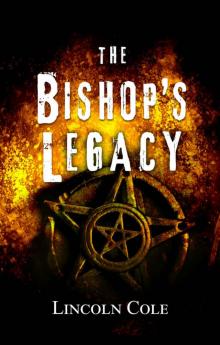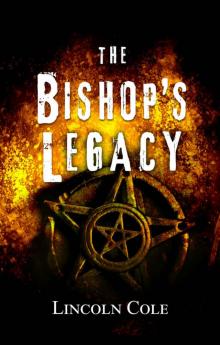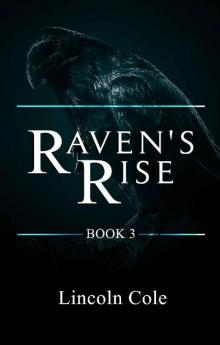- Home
- Lincoln Cole
Second Chances Page 2
Second Chances Read online
Page 2
The bill she received had been in the hundreds for a simple examination, something she couldn’t afford; she hadn’t made a second trip.
A few minutes passed and she was feeling better. Good enough to get up and walk around a little bit. She wandered to the kitchen and opened the back door, breathing the cool night air. The house was quiet, which meant her children were asleep.
She lay back down in the lonely bed, wishing like she did every night that she still had her husband beside her. He died five years earlier in a car accident, only months after Tyler was born. He had left her alone to raise the children with barely enough life insurance to pay for his funeral.
He was the one that had fought to get his children into a better school. He was the one that believed in the future, that his children deserved a better life than their parents had. He was the one that put their names on the lawsuit and demanded equality from a deaf world.
And he was gone.
Chapter 2
One year later
Richard
“Remind me why I went into law.”
“You did it so you could help people,” Deborah replied, not looking up from her magazine.
“Really?” Richard said, scratching his chin. “I thought I did it so I could bring paperwork home with me every night.”
“That too.”
Richard sighed, rubbing his tired eyes and glancing over at his wife. She was sitting on the couch beside him, reading Vanity Fair in her night gown. She had shoulder length brunette hair and green paste on her face that was supposed to clean out her pores.
They spoke quietly, just above a whisper, so they wouldn’t bother their children. Richard was still in his work clothes even though it was almost ten o’clock. Both of their children sat on the other couch, watching some police procedural show. The volume was kept low and they sat close.
“I think I watched too many TV shows when I was young,” Richard said. “I thought it was all glamour and court rooms, giving closing speeches that would win over a jury.”
“You give great speeches honey.”
“I haven’t been in a court room in half a dozen years,” he replied. “Ever since I was a public defender. Now I just go to board meetings and cut deals with other lawyers to keep their clients from being litigated.”
“Do you miss the court rooms?”
“A little,” he said, shrugging. “More than I thought I would.”
“When you worked as a public defender you told me you hated it.”
He shrugged. “Most of the time I did. But I hated the cases I was being given, not the practice itself. I just didn’t like the system: it wasn’t innocent until proven guilty, it was—”
“Guilty until proven rich,” Deborah interrupted, glancing up at him and smiling. “You’ve told me.”
He chuckled. “Yeah, I guess I have.”
“What are you working on tonight?” she asked. She picked up her cup of tea and took a sip.
“A filing. One of our clients is getting sued in a patent dispute, so we’re counter suing.”
“Is their claim legitimate?”
“In patent law? I don’t think anyone even knows what a legitimate lawsuit would look like.”
“Ah.”
“I have to submit a few documents tomorrow, then see how the other team decides to play it. If they want to settle out of court then it should get resolved in a few weeks for under a million.”
“So you have some time?” she said. “You don’t need to get it all done tonight.”
“No,” he said. “But I do need to look through these resumes.”
He held up a stack of papers. It looked to be several hundred sheets thick.
“For what?”
“A new intern,” he said. “Our last two graduated, and we need someone else to handle copyediting.”
“Need any help?”
“I think I’m okay,” he said. “I’ve narrowed it down to these four candidates. They are the most qualified.”
“Can I see the others?” Deborah asked, gesturing toward the stack.
He shrugged and handed it over. “Sure.”
She accepted the stack and set it next to her, glancing at the top few resumes. Richard watched her out of the corner of his eye, curious what she would say. One of the things he always loved about Deborah was that she had an opinion about everything.
That, and she loved to argue.
“What time is it?” she asked.
He glanced at his watch. “Almost ten.”
“Ah,” she said, leaning forward and setting her tea down. She raised her voice and addressed the children: “That means it is bedtime.”
“One more show?” Sally pleaded.
She was just past her fourteenth birthday, and she also loved to argue. The only thing she liked more than arguing with her parents was annoying them. Richard knew that, no matter what his wife said, she would stay up to watch TV in her bedroom until past midnight.
“Bed,” Deborah repeated.
Francis, their other child, yawned. “Okay,” he said. He was younger than his sister by a few years, and completely the opposite in personality: he would go out of his way to keep his parents happy, which was good and bad. Richard always worried that they were forcing him to participate in sports and clubs that he didn’t want to do, but was too scared to tell them so.
“You both finished your homework, right?”
“Yes, Mom,” they said in unison.
“Then brush your teeth and finish combing your hair…”
All three disappeared from the living room, leaving Richard alone. He turned the television off and looked over the four resumes, trying to decide which candidate he liked the most.
A few minutes later Deborah reappeared and sat next to him. She didn’t say anything, just grabbed a few papers off her stack and started glancing at them.
“I like this one,” Richard said after a few minutes. “He was on his school’s debate team for three years and they went to the state finals twice. He’s a junior.”
He handed the resume to Deborah, and she glanced it over.
“This one,” he continued, holding up another, “is starting his freshman year of college, so he’s going to be able to work with us a lot longer before graduating. He went to a better high school, too.”
“Mmhmm,” Deborah said, glancing at the offered sheet.
“What?” he asked.
“Nothing,” she said. “I just said: ‘mmhmm.’”
“You always say that when you disagree with me about something.”
“I don’t disagree. They are both great candidates. And I’m sure those other two are as well,” she said, pointing at the other ones in his lap.
“But…?” he prompted.
She laughed. “But, three of them are men and all of them are white. Your last two interns were also white men.”
He frowned at the papers. “These are the best candidates.”
“Are they?” she asked. “On paper, these four are great applicants, but no better than many of the others you already dismissed.”
“You don’t think they are qualified?”
“I’m not saying they aren’t qualified, but you chose children from rich families: they are all coming from amazing high schools and going to even better colleges. All four of them come from money and will end up making a lot of it whether or not they get this internship.”
“So?”
“So,” she said, “why not give this opportunity to someone who could actually use the help?”
Richard felt a little defensive: “We are only looking for a copyeditor.”
“That’s all you want out of this. What do they get out of it? For these four applicants, your firm is just a stepping stone, along with many others, that will help them achieve their goals. For some people, this could mean a lot more.”
Richard thought about it for a second. “Who do you recommend?”
“Her,” Deborah said, offering a sheet to
him. Richard hadn’t really noticed it in the pile, dismissing it after only a cursory glance.
“She went to an unaccredited high school,” he said, looking it over. “That’s as far as I looked on her resume.”
“She graduated with honors,” Deborah said. “She also got really good test scores on the SAT and ACT.”
“Above average,” he said, shrugging, “but the same as all of the other candidates. Everyone here is above average.”
“But she worked harder to get there,” Deborah said. “Since, as you pointed out, she went to an unaccredited high school.”
He nodded, conceding the point. “She doesn’t have a lot of extracurricular activities listed.”
“You said all you wanted was a copyeditor. Not an Olympic athlete.”
“Yes, but…” he trailed off, not really sure what he was trying to say. “It’s nice to see people who can put more down on paper, even if it’s only mostly true. It shows that they have confidence in themselves, that they know how to play the game.”
“Or, that their parents know how to play it,” Deborah said. “Maybe this girl doesn’t know how to manipulate things in her favor. Maybe you could teach her.”
Richard sighed, setting the resume down.
“You said I only picked white candidates. Is that why you picked this one? When I went through the resumes, I didn’t take race into account.”
“Maybe you should,” she said.
“So I should give this resume a leg up because she’s black?” he asked.
“You said yourself that she’s on par with the other applicants, so why didn’t she make it into your top four to begin with?”
Richard didn’t have a good answer for that. Part of him was convinced it had nothing to do with the other candidates being white. But another part of him wasn’t so sure.
“All things being equal, I would say ‘no’ you shouldn’t add race into the mix,” Deborah continued. “But, are all things equal?”
Richard didn’t respond, but he did accept the resume. He glanced it over, frowning.
“So, you think Nichole Blake is the right choice?”
“I don’t know,” Deborah said, sipping her tea. “But, I think you have to ask the question: are you only looking for help, or do you want to help someone else?”
Chapter 3
Lakeisha
“I got the internship!” Nichole said, running into the kitchen and throwing her arms around her mother.
Lakeisha staggered to the side, catching her eighteen year old daughter in her arms and laughing.
“Easy there,” she said. “Of course you got it. I knew you would be selected for sure.”
“This is awesome! It’s one of the top law firms in the city!”
“When do you start?”
“Tomorrow,” Nichole said. “First thing in the morning.”
“Congratulations,” Lakeisha said, smiling. She gently extricated herself from her excited daughter and walked to the stove to check on dinner. “You don’t have to work weekends, right?”
“No, why?”
“Because Rico’s wedding is on a Saturday,” Lakeisha said.
Nichole laughed. “Mom, that isn’t for nine months!”
“I know,” she said with a shrug, “I just wanted to make sure you didn’t have any conflicts. No excuses to not go to his wedding!”
“I won’t have any excuses,” Nichole said. She looked at the letter again from the law office and grinned. “I think I’m going to go out and celebrate tonight!”
“Okay,” Lakeisha said. “But don’t do anything crazy. You will have to get up super early in the morning for your first day.”
“Do you want to go get dinner?” Nichole asked.
“I would,” Lakeisha said, “but I already have this cooking. Besides, I have some stuff to take care of tonight. Maybe tomorrow night?”
“Okay,” Nichole said. “Tomorrow sounds great. And don’t worry, I won’t be out too late.”
Nichole disappeared through the back door, leaving her mother alone in the kitchen. Lakeisha turned the stove off and put a sheet of aluminum foil over the steaming dish: macaroni and cheese with tuna mixed in, Tyler’s favorite. It was one of the few things he would regularly eat that his sister Kenni could also stomach.
“Kenni!” Lakeisha called up the stairs.
There was no reply from her moody child, so she climbed up to the second floor and went to her daughter’s room. The door was shut.
Kenni almost never shut her door. She liked to keep it open, being mildly claustrophobic, and the only time it wasn’t was when she was upset. Lakeisha hated seeing her daughter so unhappy.
And things had been going so well.
“Kenni?” she asked, gently knocking on the door.
“Go away,” Kenni said, voice muffled.
“I’m going to go out for a bit,” she said. “Do you want to come with me?”
“No,” Kenni said. “I don’t want to go anywhere.”
Her voice was thick with emotion as though she’d been crying. She’d been crying most of the last two weeks, ever since they received the letter from Northmont middle school.
Essentially, the school had sent a notice telling Lakeisha that, despite the court ruling a year ago that Kenni and Tyler would be allowed to attend Northmont elementary and middle school, the low income housing they lived in was being reclassified by the city and the school district boundaries had been redrawn.
Therefore, the terms of the decision no longer applied and Kenni would need to return to her old middle school. The letter informed her that an injunction could be filed, of course, to change the terms of the original decision to fit this new circumstance, but it would require a separate case to hear the new situation.
Basically, it would cost a few thousand more dollars to keep Kenni in the same school the courts already ruled she could attend, all because of a well-orchestrated technicality.
The news devastated Kenni. It had taken her months to get acclimated to the new school and make new friends. Some of the students were standoffish in the beginning, but most had been welcoming and friendly.
The anger and fear from the parents had even dissipated, and everyone Lakeisha dealt with was polite and welcoming. Once it was clear that nothing terrible was happening to their school by bringing these new students in, everyone calmed back down and relaxed.
During the school year, Kenni had made a lot of good friends at Northmont, many of which invited her to their homes and several of which even came here, to Kenni’s home. Considering it was a two hour drive one way, Lakeisha considered that quite a win.
None of those other students at Northmont knew what had happened with this court case, and summer break was scheduled to last another few weeks. With luck, none of Kenni’s friends would ever know that Kenni almost wasn’t coming back to Northmont middle school. Lakeisha would do everything in her power to make sure Kenni didn’t have to change schools again.
Which was where Lakeisha was heading now, to solve that problem. She needed to go to the bank to get a short-term loan. Then she would be able to use the money to hire a lawyer and get the injunction filed. More hoops and roadblocks, but she was determined. With any luck, this time next week Kenni would be reenrolled in Northmont Elementary, a solid week before school started back up.
She didn’t want to say anything yet to Kenni, not until she had the money in hand and had spoken to a lawyer. She wanted to make sure all of the paperwork went through and there weren’t any problems before she got her daughter’s hopes up. But, she was confident things would work out.
“Okay sweetie,” she said, leaning against the door. “I’ll be home later tonight. Keep an eye on Tyler for me, will you?”
No response.
“I love you,” she said.
The room remained quiet, except a single sniffle.
Lakeisha sighed and headed to Tyler’s room. He was playing a video game, engrossed, so she gave him a quick hug.
He pulled his arms free and kept tapping on his controller, never taking his eyes off the screen. “Love you too,” he said absently.
“Dinner is on the counter. Make sure to eat something.”
“Okay.”
Lakeisha watched him for a minute and then headed downstairs to the kitchen. She left a note for Nichole, saying she was heading out for a bit and would be back later that night, and then went out to catch the bus.
***
It was an hour and forty-five minute ride to the bank, and by the time she arrived at her stop it was getting dark outside. The bus was running late, a lot later than she had hoped, and she didn’t know if the bank would still be open.
She stepped onto the busy sidewalk and headed quickly down the road. It was another nine blocks to reach the bank, and she was worried she would miss her opportunity. There wasn’t a lot of foot traffic this late in the evening, so at least she wasn’t weaving through crowds to get there.
She hurried, feeling a tightness in her chest as she exerted herself. She didn’t do a lot of exercise, and it was really showing as she pushed her body beyond comfortable levels.
As she went, the discomfort grew worse, turning into a throbbing pain in her chest and sides. She fought it down and kept moving, determined not to be late.
She arrived just as the sun was setting. A man stood out front, chaining the front doors shut as she approached.
“Excuse me, are you closed?” she asked, panting.
The man looked surprised to be addressed. “Yeah,” he said. “Everyone already went home for the night.”
“I only need a few minutes to talk to someone because I need—”
He held up a hand to cut her off. “I’m sorry, ma’am, but we don’t have any more bankers here this late. Everyone is gone, and I’m just a janitor closing up.”
She sighed. “Damn.”
“I wish I could help you out,” he said, snapping the lock into place, “but you’re going to have to come back tomorrow.”
She rubbed her temples.
“Ma’am, are you okay?”
“I’m fine,” she said, fighting down a headache. “I’m fine.”

 The Everett Exorcism
The Everett Exorcism The Everett Exorcism (World of Shadows Book 1)
The Everett Exorcism (World of Shadows Book 1) The Bishop's Legacy
The Bishop's Legacy The Bishop's Legacy (World of Shadows Book 3)
The Bishop's Legacy (World of Shadows Book 3) Raven's Rise (World on Fire Book 3)
Raven's Rise (World on Fire Book 3) The Vatican Children (World of Shadows Book 2)
The Vatican Children (World of Shadows Book 2) Raven's Fall (World on Fire Book 2)
Raven's Fall (World on Fire Book 2) Ripples Through Time
Ripples Through Time Second Chances
Second Chances Graveyard of Empires
Graveyard of Empires